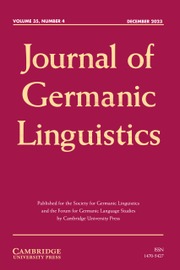Article contents
A (Very) Imperfect Sandwich: English Should, German Sollte, Dutch Mocht/Moest as Grammaticalizing Markers of Conditionality
Published online by Cambridge University Press: 11 November 2016
Abstract
Based on a comparative corpus study, the present paper contrasts conditionals containing the modal verbs sollte in German, should in English, and mocht/moest in Dutch. The conditionals are examined with respect to the linkage levels between protasis and apodosis, the tense/mood patterns in the two clauses, and the degree of syntactic integration of the protasis into the apodosis. We argue that sollte, should, mocht, and moest are undergoing a process of grammaticalization as markers of conditionality, understood as upwards reanalysis in the hierarchy of functional projections. We show that this grammaticalization process is at different stages in the different languages, not showing any “sandwich”-like pattern.
- Type
- Articles
- Information
- Journal of Germanic Linguistics , Volume 28 , Special Issue 4: New Directions in Comparative Germanic Linguistics , December 2016 , pp. 282 - 316
- Copyright
- Copyright © Society for Germanic Linguistics 2016
References
REFERENCES
Corpora and Other Data Sources
- 4
- Cited by




